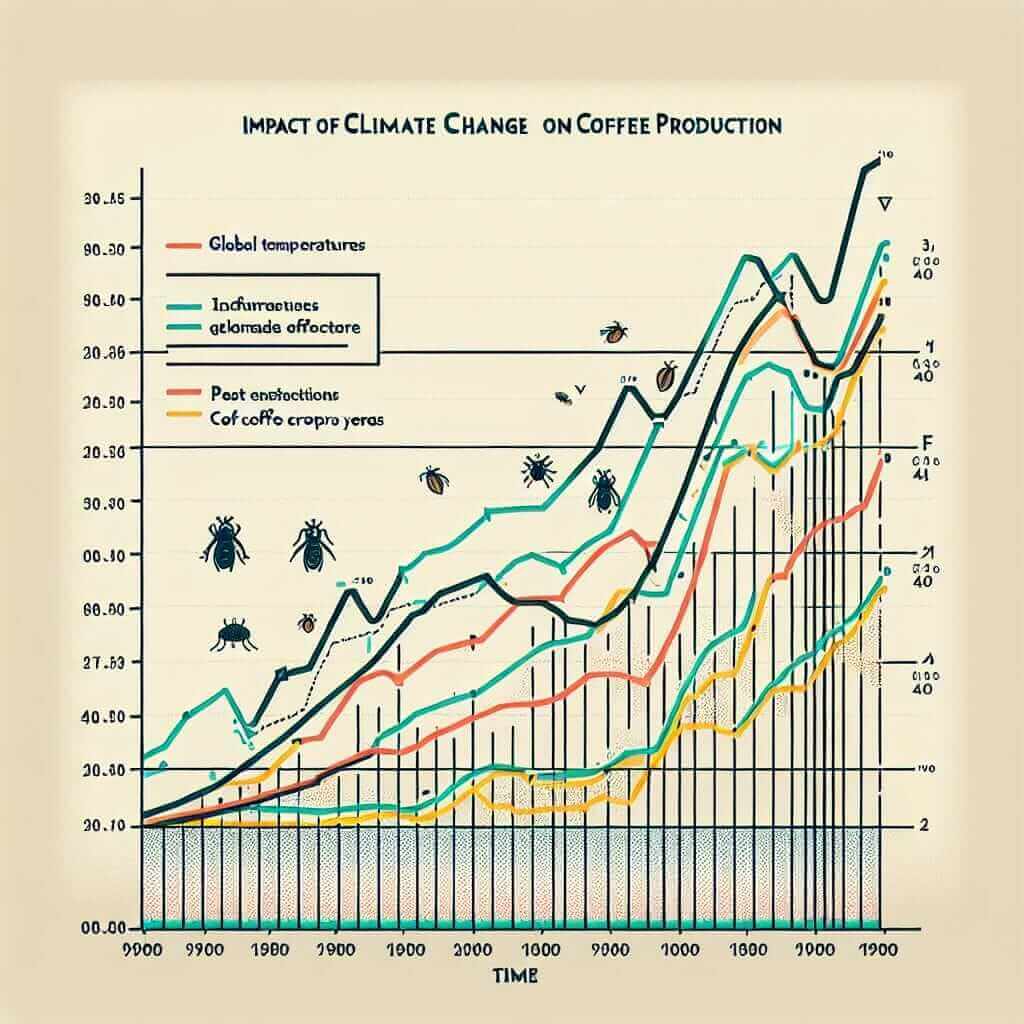The IELTS Reading test is an essential part of the exam, often seen as one of the most challenging sections. A recurring theme in IELTS Reading passages relates to global challenges, particularly environmental issues like climate change. Among these, the impact of climate change on the coffee industry is a topical subject, reflecting its relevance in both public consciousness and its potential appearance in the test. This article will provide a structured reading passage on the theme “How does climate change affect the global coffee industry?” and offer a practice test designed to help you hone your skills for the exam.
Practice Reading Passage
Title: The Impact of Climate Change on the Global Coffee Industry
Paragraph 1
Climate change has emerged as a significant threat to numerous industries globally, with the coffee sector being particularly vulnerable. The cultivation of coffee, predominantly Arabica, thrives in specific climatic conditions, typically within the ‘coffee belt’ which spans regions across South America, Africa, and Asia. These areas are experiencing increasing temperatures, unpredictable weather patterns, and frequent extreme weather events, significantly impacting coffee production.
Paragraph 2
Rising temperatures and changing precipitation patterns pose severe risks to coffee cultivation. Higher temperatures can accelerate the maturation process of coffee cherries, leading to lower bean quality. Additionally, the altered climate conditions foster the proliferation of pests and diseases, such as the coffee leaf rust and the coffee berry borer, which can devastate coffee crops.
Paragraph 3
The economic implications of climate change on coffee farmers are profound. Smallholder farmers, who constitute the majority of coffee producers, often lack the resources to adapt to these changes. The decline in coffee yields and quality can reduce their income, exacerbating poverty and threatening their livelihoods. This economic pressure is felt throughout the supply chain, affecting traders, exporters, and ultimately consumers.
Paragraph 4
Adaptation strategies are being implemented to mitigate these impacts. These include switching to climate-resilient coffee varieties, adopting sustainable farming practices, and diversifying crops to reduce dependency on coffee. Moreover, global coffee companies and non-governmental organizations are investing in research and development to support these adaptations.
Paragraph 5
Despite these efforts, the coffee industry’s future remains uncertain. The complex interplay between climate change, economic factors, and labor dynamics requires concerted global action. Ensuring the sustainability of coffee production will demand not only local and national initiatives but also international cooperation and policy interventions.
Questions
Multiple Choice Questions (Choose one answer)
-
What is a significant consequence of higher temperatures on coffee production?
- A) Increased bean quality
- B) Accelerated maturation of cherries leading to lower bean quality
- C) Reduced water requirements for coffee plants
- D) Decreased incidence of pests
-
How do changing precipitation patterns affect coffee cultivation?
- A) Decrease in coffee variety
- B) Increase in the resources of farmers
- C) Proliferation of pests and diseases
- D) Improvement in coffee taste
True/False/Not Given
-
Climate change affects only the coffee industry in South America.
- True
- False
- Not Given
-
Smallholder farmers are generally well-equipped to adapt to climate change.
- True
- False
- Not Given
Match the Information
-
Match the following:
- A) Coffee leaf rust
- B) Climate-resilient coffee varieties
- C) Smallholder farmers
- D) Coffee supply chain
- A pest affecting coffee crops
- Adaptation strategy
- Major coffee producers
- Affected by economic pressure
Sentence Completion
- Climate change requires __ to ensure the sustainability of coffee production.
Answer Keys
Multiple Choice Questions
- B) Accelerated maturation of cherries leading to lower bean quality
- C) Proliferation of pests and diseases
True/False/Not Given
- False (The passage mentions global effects on the coffee industry)
- False (It states that smallholder farmers lack the resources to adapt)
Match the Information
- A-1; B-2; C-3; D-4
Sentence Completion
- concerted global action
Key Takeaways
Common Mistakes
- Misinterpreting the details: Ensure you understand the nuances in the passage.
- Skipping context: Read the whole passage before answering questions to get the complete context.
Vocabulary Development
- Cultivation (noun) /ˌkʌltɪˈveɪʃən/: the process of growing plants or crops.
- Adaptation (noun) /ˌædəpˈteɪʃən/: the process of changing to suit different conditions.
- Proliferation (noun) /prəˌlɪfəˈreɪʃən/: a rapid increase in numbers.
- Mitigate (verb) /ˈmɪtɪˌɡeɪt/: to make something less severe.
Grammar Insights
- Conditionals: Used to discuss outcomes of climate change, e.g., “If temperatures rise, coffee quality will decrease.”
- Complex sentences: To explain cause and effect, e.g., “The cultivation of coffee, predominantly Arabica, thrives in specific climatic conditions, which are being altered by climate change.”
Tips for High Reading Scores
- Skimming and Scanning: Quickly get the gist of the passage and locate specific information.
- Understanding Different Question Types: Practice various question formats like multiple choice, true/false/not given, and sentence completion.
- Time Management: Allocate time wisely to go through all questions without rushing.

Indeed, mastering the IELTS Reading section requires a blend of strategic practice, thorough understanding, and building up the right skills. This article provides not just a practice reading passage, but also essential strategies and insights to excel in the actual exam.
Good luck with your preparations!